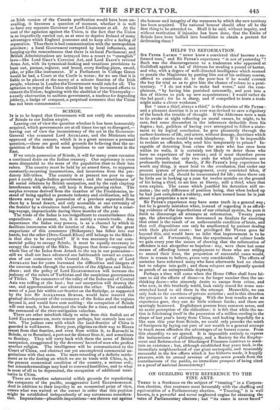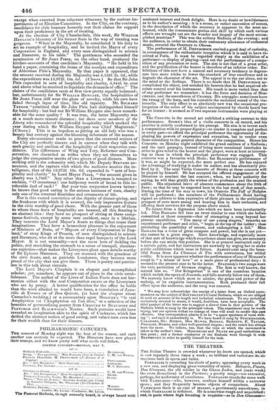ON GUZZLING WITH REFERENCE TO THE FINE ARTS.
THERE is a frankness on the subject of " treating" in a Corpora- tion election, that contrasts most favourably with the shuffling and equivocation of a Parliamentary election. " Treating," it is well known, is a powerful and never neglected engine for obtaining the votes of Parliamentary electors ; but "its name is never heard"
except when extorted from reluctant witnesses by the curious im- pertinents of an Election Committee. In the'City, on the contrary, candidates for civic honours honestly rest their claims for support upon :their proficiency in the art of treating. At the election of City Chamberlain, this week, Sir WILLIAM HEYGATE'S blazonry of his former feats in the way of treating was gorgeous. "When in the Mayoralty, he considered it his duty to set an example of hospitality, and he invited the Mayor of every Corporation in England, and every man distinguished in science and literature, to his table." The gentleman who seconded the nomination of Sir JOHN Puna, on the other hand, produced the kitchen-accounts of that candidate's Mayoralty. "He held in his hand a paper, containing the items of the receipts and expenditure of Alderman Pirie's Mayoralty. By that paper it appeared, that the amount received during the Mayoralty was 8,1281. 2s. 6d., while the expenditure was 13,9721. 10s. 6d. (Cheers.) So that Sir John Pirie expended in acts of hospitality and charity, 5,8441. 8s. over and above what he received to liquidate the demands of office." The claims of the candidates seem at first view pretty equally balanced ; but, unfortunately for Sir WILLIAM HETGATE, the hospitalities of Sir Jona PIRIE still wear the gloss of novelty, while his own have faded through lapse of time, like old tapestry. Mr. RICHARD TAYLOR " admitted that Sir John Pirie had distinguished himself for hospitality : but had not Sir William Heygate also been remark- able for the same quality ? It was true, the latter Mayoralty was at a much more remote distance; but there were members of the Livery who remembered the splendid hospitality which marked the year during which Sir William Heygate was Chief Magistrate." (Cheers.) This is as hopeless as pitting an old lady who was a beauty last century against the blooming debutante of the season. Every circumstance tends to prove that the reverend seniors of the City are perfectly sincere and in earnest when they talk with such gravity and unction of the hospitality of their respective can- didates. The differences of Whig and Tory, Reformer and Con- servative, are discarded as trifles when they set themselves to judge the comparative merits of two givers of good dinners. More striking still is the solemnity with which Mr. Deputy STEVENS an- nounces, and the rapture with which the audience receive the in- telligence, that of the 13,9721. 10s. 6d. expended in " acts of hos- pitality and charity " by Lord Mayor Puna, " the amount given in charity was 1,7001." Any other than a Liveryman is tempted to exclaim, " 0 monstrous ! one halfpenny worth of bread to this in- tolerable deal of sack ! " But your true corporator knows better : he knows that good eating is the serious business of men, charity only one of the external flourishes and ornaments of life.
Nor is this rooted conviction of the dignity of dinner-giving, and the frankness with which it is avowed, the only impressive feature in the civic worship of good cheer. With the greater part of those to whom these feats of hospitality are boasted, all this feasting is an abstract idea : they have no prospect of sitting at these sump- tuous festivals, except by some rare accident, once in a lifetime. They venerate the Lord Mayor's feasts as things that rouse their imaginations. They have a benevolent pleasure in the enjoyment ofMinisters of State, of " Mayors of every Corporation in Eng- land," of stray Kings of Prussia, of men distinguished in science and literature, who sit at the more than regal banquets of the Lord Mayor. It is not sensuality—not the mere love of tickling the palate, and stretching the stomach to a sense of tranquil, slumber- ous repletion—that makes the Liverymen gloat upon details worthy of Sir Epicure Mammon. They are stunned with the grandeur of the civic feasts, and, as patriotic Londoners, they become more proud of the city that can give them. There is poetry and patriot- ism in this talk about victuals.
The Lord Mayor's Chaplain is an elegant and accomplished scholar; yet, somehow, he appears out of place in the civic estab- lishment. The author of the Lives of Italian Poets does not har- monize either- with the real Corporation eaters or the Liverymen who eat by proxy. A better qualification for the office he holds than the work alluded to would have been, a translation of Laza- rillo de Tonnes or of-Don Quixote, (at least the -chapter about Camacho's wedding,) or a commentary upon MoLIERE's "le vrai Amphytrion est l'Amphytrion ou l'on dine," or a selection of the beauties of gormandizing poetry from CHAUCER to BEAUMONT and FLETCHER and BLACKWOOD'S Noctes. Such pursuits would have revealed an imagination akin to the spirit of Cockayne, which has deified the abstract notion of good eating, and values men even less for their wealth than for their dinners.



























 Previous page
Previous page